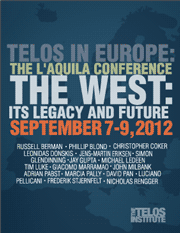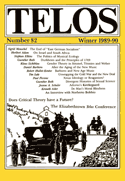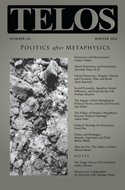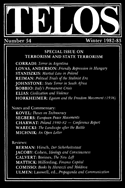By Adrian Pabst · Tuesday, February 12, 2013 Pope Benedict XVI’s resignation was certainly sudden but not altogether unexpected. During the pontificate of his predecessor, the then Cardinal Ratzinger seems to have advised the long-suffering Pope John Paul II to renounce the Petrine office. Crucially, in mid-2010 Benedict gave a strong indication that he was considering abdicating. On April 29, 2009, he left his pallium—the sign of Episcopal authority—on the tomb of Pope Celestine V in the Basilica Santa Maria di Collemaggio, in L’Aquila. In the same location Celestine had been crowned pontiff on August 29, 1294—an event that is commemorated as the festival of Perdonanza Celestinana in the earthquake-stricken city every August 28–29. It is unlikely that Benedict’s highly symbolic gesture was a random act. Clearly he felt a deep spiritual connection with the studious monk-pope Celestine, who abdicated in 1295.
Continue reading →
By Greg Melleuish · Monday, February 11, 2013 The following paper was presented at Telos in Europe: The L’Aquila Conference, held on September 7-9, 2012, in L’Aquila, Italy.
 We live in an age of History Wars. We live in an age of History Wars.
Most of them are national in focus.
There is, however, one that touches on the issue of Western civilization, and that is the perceived conflict between Western civilization and world history.
Advocates of world history castigate Western civilization for pretending to be universal when, in fact, it is partial and prejudiced.
Continue reading →
By Maja Sidzinska · Tuesday, February 5, 2013 As an occasional feature on TELOSscope, we highlight a past Telos article whose critical insights continue to illuminate our thinking and challenge our assumptions. Today, Maja Sidzinska looks at Guenther Roth’s “Durkheim and the Principles of 1789: The Issue of Gender Equality,” from Telos 82 (Winter 1989).
 Guenther Roth positively establishes that the principles of 1789—liberté, egalité, fraternité—have been overridden by Émile Durkheim’s essentializing gender prescriptions in the service of social stability. He shows that mutually exclusive and unequal gender roles were central to Durkheim’s theory of organic solidarity. But Roth’s examination does more than just explain theoretical contradictions present in Durkheim’s work. His inquiry invites new investigations into Durkheim’s gender politics, the most intriguing one provoked by his comparative treatment of Durkheim’s and Marianne Weber’s perspectives on marriage and divorce. These contemporaries shared a political outlook yet diverged greatly in their ultimate directives for society. Guenther Roth positively establishes that the principles of 1789—liberté, egalité, fraternité—have been overridden by Émile Durkheim’s essentializing gender prescriptions in the service of social stability. He shows that mutually exclusive and unequal gender roles were central to Durkheim’s theory of organic solidarity. But Roth’s examination does more than just explain theoretical contradictions present in Durkheim’s work. His inquiry invites new investigations into Durkheim’s gender politics, the most intriguing one provoked by his comparative treatment of Durkheim’s and Marianne Weber’s perspectives on marriage and divorce. These contemporaries shared a political outlook yet diverged greatly in their ultimate directives for society.
Continue reading →
By Adrian Pabst · Thursday, January 31, 2013 Adrian Pabst’s “The Politics of Paradox: Metaphysics beyond ‘Political Ontology'” appears in Telos 161 (Winter 2012). Read the full version online at the Telos Online website, or purchase a print copy of the issue in our store.
 Since the onset of the Enlightenment, much of modern thought has celebrated the end of metaphysics and the death of God. The project of “political ontology,” which combines post-metaphysical with post-theistic thinking, underpins the scientific rationalism that pervades contemporary philosophy and politics. Faced with the secular slide into skepticism, relativism, and nihilism, this essay argues that the only genuine alternative to “political ontology” is a metaphysical politics of paradox. Philosophically, modernity and postmodernity invented and intensified the onto-theological science of transcendental ontology that can be traced to Scotus, Ockham, Machiavelli, and Suárez. They bequeathed three currents—possibilism, transcendentalism, and absolutism—that flow through figures such as Descartes, Wolff, and Clauberg to Kant, Hegel, and Comte. Since the onset of the Enlightenment, much of modern thought has celebrated the end of metaphysics and the death of God. The project of “political ontology,” which combines post-metaphysical with post-theistic thinking, underpins the scientific rationalism that pervades contemporary philosophy and politics. Faced with the secular slide into skepticism, relativism, and nihilism, this essay argues that the only genuine alternative to “political ontology” is a metaphysical politics of paradox. Philosophically, modernity and postmodernity invented and intensified the onto-theological science of transcendental ontology that can be traced to Scotus, Ockham, Machiavelli, and Suárez. They bequeathed three currents—possibilism, transcendentalism, and absolutism—that flow through figures such as Descartes, Wolff, and Clauberg to Kant, Hegel, and Comte.
Continue reading →
By Yonathan Listik · Tuesday, January 29, 2013 As an occasional feature on TELOSscope, we highlight a past Telos article whose critical insights continue to illuminate our thinking and challenge our assumptions. Today, Yonathan Listik looks Norbert Elias’s “Civilization and Violence: On the State Monopoly of Physical Violence and its Infringements,” from Telos 54 (Winter 1982).
 Norbert Elias’s argument in “Civilization and Violence: On the State Monopoly of Physical Violence and its Infringements” is especially helpful for understanding the developments of terrorism, and it also applies to contemporary phenomena such as the war on drugs. He contends that placing the monopoly of violence in the hands of the state comes from a desire of harmonization. The assumption is that stability depends on an imposed self-discipline. That is, the state represents the interests of the collective and should provide for it. This is very enlightening considering the assumptions in the “war on drugs.” Norbert Elias’s argument in “Civilization and Violence: On the State Monopoly of Physical Violence and its Infringements” is especially helpful for understanding the developments of terrorism, and it also applies to contemporary phenomena such as the war on drugs. He contends that placing the monopoly of violence in the hands of the state comes from a desire of harmonization. The assumption is that stability depends on an imposed self-discipline. That is, the state represents the interests of the collective and should provide for it. This is very enlightening considering the assumptions in the “war on drugs.”
Continue reading →
By Telos Press · Saturday, January 26, 2013 An excerpt from Carl Abrahamsson’s recent review of Ernst Jünger’s The Adventurous Heart, published by Telos Press. Read the full review here.
 The Adventurous Heart is a perfect title for the book. Once inside, each page is like an adventure and it does indeed belong more in the sphere of the heart than in the rational mind. Strolling through nature—both the chlorophyllic and the human—Jünger ponders phenomena as well as his own conclusions in an intuitive way. Aloof, yes, but always intriguing enough to keep you hooked. It’s an unpredictable mystery, very subtly designed, and which works over and over and over (try re-reading On the Marble Cliffs or this one and see how much new stuff actually appears. A literary tricking of memory or simply a living, sentient text?). . . . The Adventurous Heart is a perfect title for the book. Once inside, each page is like an adventure and it does indeed belong more in the sphere of the heart than in the rational mind. Strolling through nature—both the chlorophyllic and the human—Jünger ponders phenomena as well as his own conclusions in an intuitive way. Aloof, yes, but always intriguing enough to keep you hooked. It’s an unpredictable mystery, very subtly designed, and which works over and over and over (try re-reading On the Marble Cliffs or this one and see how much new stuff actually appears. A literary tricking of memory or simply a living, sentient text?). . . .
Continue reading →
|
|
 We live in an age of History Wars.
We live in an age of History Wars.  Guenther Roth positively establishes that the principles of 1789—liberté, egalité, fraternité—have been overridden by Émile Durkheim’s essentializing gender prescriptions in the service of social stability. He shows that mutually exclusive and unequal gender roles were central to Durkheim’s theory of organic solidarity. But Roth’s examination does more than just explain theoretical contradictions present in Durkheim’s work. His inquiry invites new investigations into Durkheim’s gender politics, the most intriguing one provoked by his comparative treatment of Durkheim’s and Marianne Weber’s perspectives on marriage and divorce. These contemporaries shared a political outlook yet diverged greatly in their ultimate directives for society.
Guenther Roth positively establishes that the principles of 1789—liberté, egalité, fraternité—have been overridden by Émile Durkheim’s essentializing gender prescriptions in the service of social stability. He shows that mutually exclusive and unequal gender roles were central to Durkheim’s theory of organic solidarity. But Roth’s examination does more than just explain theoretical contradictions present in Durkheim’s work. His inquiry invites new investigations into Durkheim’s gender politics, the most intriguing one provoked by his comparative treatment of Durkheim’s and Marianne Weber’s perspectives on marriage and divorce. These contemporaries shared a political outlook yet diverged greatly in their ultimate directives for society.  Since the onset of the Enlightenment, much of modern thought has celebrated the end of metaphysics and the death of God. The project of “political ontology,” which combines post-metaphysical with post-theistic thinking, underpins the scientific rationalism that pervades contemporary philosophy and politics. Faced with the secular slide into skepticism, relativism, and nihilism, this essay argues that the only genuine alternative to “political ontology” is a metaphysical politics of paradox. Philosophically, modernity and postmodernity invented and intensified the onto-theological science of transcendental ontology that can be traced to Scotus, Ockham, Machiavelli, and Suárez. They bequeathed three currents—possibilism, transcendentalism, and absolutism—that flow through figures such as Descartes, Wolff, and Clauberg to Kant, Hegel, and Comte.
Since the onset of the Enlightenment, much of modern thought has celebrated the end of metaphysics and the death of God. The project of “political ontology,” which combines post-metaphysical with post-theistic thinking, underpins the scientific rationalism that pervades contemporary philosophy and politics. Faced with the secular slide into skepticism, relativism, and nihilism, this essay argues that the only genuine alternative to “political ontology” is a metaphysical politics of paradox. Philosophically, modernity and postmodernity invented and intensified the onto-theological science of transcendental ontology that can be traced to Scotus, Ockham, Machiavelli, and Suárez. They bequeathed three currents—possibilism, transcendentalism, and absolutism—that flow through figures such as Descartes, Wolff, and Clauberg to Kant, Hegel, and Comte.  Norbert Elias’s argument in “Civilization and Violence: On the State Monopoly of Physical Violence and its Infringements” is especially helpful for understanding the developments of terrorism, and it also applies to contemporary phenomena such as the war on drugs. He contends that placing the monopoly of violence in the hands of the state comes from a desire of harmonization. The assumption is that stability depends on an imposed self-discipline. That is, the state represents the interests of the collective and should provide for it. This is very enlightening considering the assumptions in the “war on drugs.”
Norbert Elias’s argument in “Civilization and Violence: On the State Monopoly of Physical Violence and its Infringements” is especially helpful for understanding the developments of terrorism, and it also applies to contemporary phenomena such as the war on drugs. He contends that placing the monopoly of violence in the hands of the state comes from a desire of harmonization. The assumption is that stability depends on an imposed self-discipline. That is, the state represents the interests of the collective and should provide for it. This is very enlightening considering the assumptions in the “war on drugs.”  The Adventurous Heart is a perfect title for the book. Once inside, each page is like an adventure and it does indeed belong more in the sphere of the heart than in the rational mind. Strolling through nature—both the chlorophyllic and the human—Jünger ponders phenomena as well as his own conclusions in an intuitive way. Aloof, yes, but always intriguing enough to keep you hooked. It’s an unpredictable mystery, very subtly designed, and which works over and over and over (try re-reading On the Marble Cliffs or this one and see how much new stuff actually appears. A literary tricking of memory or simply a living, sentient text?). . . .
The Adventurous Heart is a perfect title for the book. Once inside, each page is like an adventure and it does indeed belong more in the sphere of the heart than in the rational mind. Strolling through nature—both the chlorophyllic and the human—Jünger ponders phenomena as well as his own conclusions in an intuitive way. Aloof, yes, but always intriguing enough to keep you hooked. It’s an unpredictable mystery, very subtly designed, and which works over and over and over (try re-reading On the Marble Cliffs or this one and see how much new stuff actually appears. A literary tricking of memory or simply a living, sentient text?). . . .

